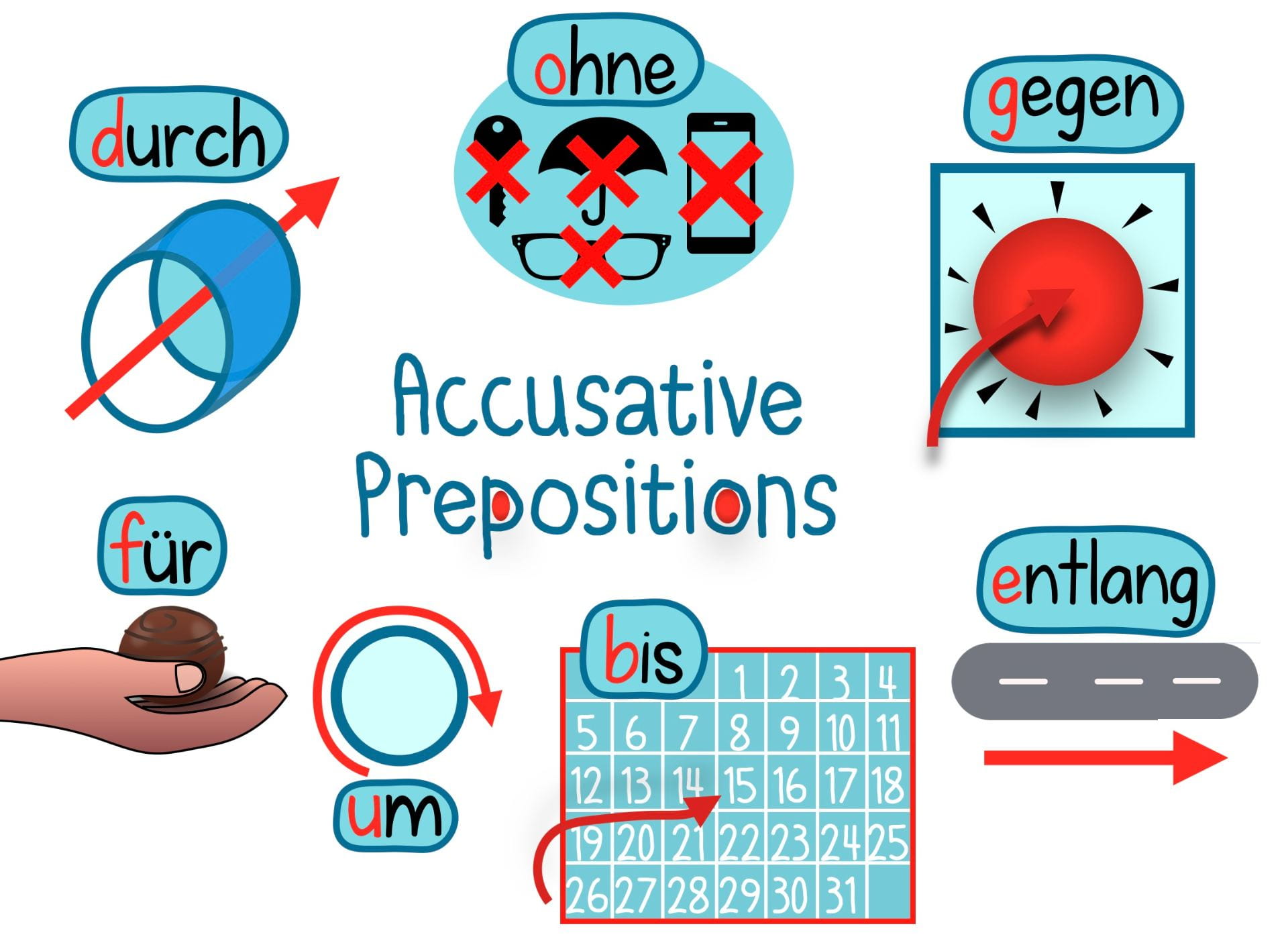Question 1: Select the matching German preposition for each English preposition.
a for →
b without →
c until →
d along →
e around, about, at →
f against →
g through, because of →
|
Note: Keep in mind that there is not always a simple one-to-one correspondence between German and English prepositions. For instance, the German preposition gegen (against) is used in some circumstances where an English speaker would say für (for). "Haben Sie etwas gegen Kopfschmerzen (against a headache)?" is an example: English speakers would say: "Do you have something for a headache?"
|
 Question 2: Which prepositions are required?
Question 2: Which prepositions are required? a Ich möchte eines Tages die Welt reisen. – I'd like to travel around the world one day.
b Er hat mir das Schienbein getreten. – He kicked me on the shin. (different preposition in German)
c nächste Woche! – See you next week! (not a literal translation)
d Wir sind letztes Jahr unsere Kinder in den Urlaub gefahren. – Last year we went on holiday without our children.
e Die Straße waren viele Autos geparkt. – Several cars were parked along the street.
f diese Jahreszeit ist es viel zu heiß. – For this time of year, it's far too hot.
g Ich habe sie meinen Freund kennengelernt. – I met her (or got to know her) through my friend.
Question 3: Refer to the two grammar tables. Choose the correct prepositions, articles and pronouns for the sentences below them.
|
Accusative Articles
|
|
Accusative Pronouns
|
|
|
Definite
|
Indefinite
|
|
|
Singular
|
Plural
|
|
masculine
|
den
|
einen
|
|
1st Person
|
mich
|
uns
|
|
feminine
|
die
|
eine
|
|
2nd Person
|
dich
|
euch
|
|
neuter
|
das
|
ein
|
|
3rd Person
|
ihn / sie / es
|
sie
|
|
plural
|
die
|
XXXX
|
|
Formal Address: Sie
|
 a Er ist dreimal Park gejoggt. – He jogged around the park three times.
a Er ist dreimal Park gejoggt. – He jogged around the park three times.
b Unsere Katze kommt Katzentür ins Haus. – Our cat comes into the house through the cat door.
c Er liebt sie sehr. Er will nicht mehr leben. – He loves her very much. He doesn't want to live any more without her.
d Es geht Prinzip. – It's (about) the principle of the thing, it's a question of principle.
e Kann ich sonst noch etwas tun? – Can I do anything more for you? (formal address)
f Sie ist Strom geschwommen. – She swam against the current.
g Wir sind mit dem Fahrrad die Elbe gefahren. – We rode along the Elbe River.
h Ich habe ein kleines Geschenk . – I have a little present for you. (to one familiar)
i Der Zug fährt nur Blackburn. – The train is only going as far as Blackburn.
j Ich bin schwer erkältet. Ich kann nicht mehr Nase atmen. – I have a bad cold. I can't breathe any more through my nose. (German: the nose)
k Dieser Schuhladen wird sechs Uhr abends geöffnet sein. Wenn Sie Ecke gehen, finden Sie auch einen Supermarkt. - This shoe shop will be open until 6 o'clock in the evening. If you go around the corner, you'll also find a supermarket.